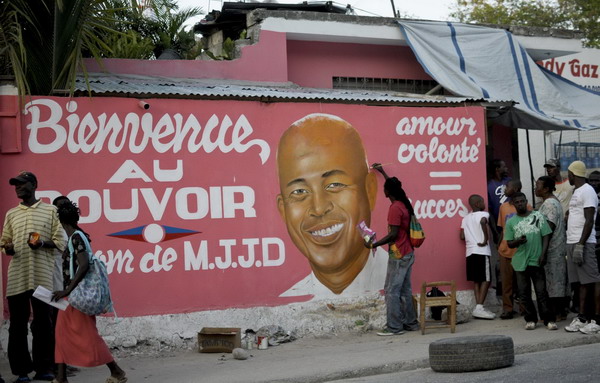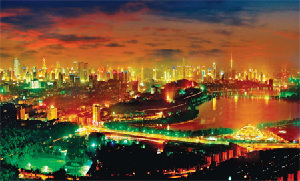Politics
Crowd throws bottles, rocks at Haiti prez
Updated: 2011-07-27 13:31
(Agencies)
|
 An artist paints a mural of Haiti's President-elect Michel Martelly in Port-au-Prince May 12, 2011. Martelly will be officially inaugurated as president on Saturday. [Photo/Agencies]
|
Martelly wasn't injured during the unexpected protest Sunday in Cap Haitien, the country's second-largest city, and police haven't determined a precise motive for the ruckus.
But it is becoming increasingly apparent in a country overwhelmed by poverty, natural disasters, disease and decades of unfulfilled governmental promises that Haitians have little patience for politicians who don't produce - even if it is a president who has been in office for less than three months.
"Martelly made a lot of promises - but so far nothing," said Frantz Nelson, a 34-year-old who voted for the former singer. Nelson said he had hoped Martelly would help get him and his family out of an encampment across from the National Palace where they have lived since a massive earthquake struck the country in January 2010.
"We are impatient and our children are impatient."
One of the keys to Martelly's success in last November's election was his outsider status, which attracted voters apparently tired of the traditional, educated elite who tend toward higher office in the Caribbean country.
Martelly, aware of the growing signs of disenchantment, insists he's still on track to achieve his lofty campaign pledges. "I promise to do this for the benefit of the masses and our citizens and create conditions for the recovery of our country," he said at a meeting of the Interim Haiti Recovery Commission earlier this month.
The president has made some attempts at progress: His administration launched a program that aims to put kids in school with fees collected from wire transfers and international phone calls, and presented a plan to relocate 30,000 people from six major earthquake encampments into repaired houses.
Former US President Bill Clinton, the UN Special Envoy to Haiti, announced last week that his foundation would kick in $1.25 million to help raise school funding, but the new fees have angered Haitians overseas because it raised the cost of calling and sending money back home for a largely working-class community. The administration also drew criticism for evicting people from one of the earthquake encampments before creating housing elsewhere. Even if it were to succeed, Martelly's relocation plan would help a mere 5 percent of the displaced population.
Mark Schneider of the US-based think tank the International Crisis Group praised Martelly for the housing plan and for retaining the Interim Haiti Recovery Commission, an international review panel that oversees earthquake reconstruction aid that some Haitians view with resentment. But he also said the new president needs to learn how to work across party lines.
"He needs to govern with a vision of national reconciliation and national reconstruction," Schneider said. "That has to be his mantra."
Martelly's biggest apparent misstep so far has been his picks for prime minister.
His initial choice was rejected overwhelmingly by the Chamber of Deputies. They accused the nominee, businessman Daniel-Gerard Rouzier, of tax evasion and questioned his citizenship. Many believed the real reason for Rouzier's rejection was that Martelly hadn't done enough to win the lawmakers' support beforehand. There are only three people from Martelly's party in the 99-seat Chamber of Deputies and none in the 30-seat Senate.
"He's learning the hard way," said Sen. Steven Benoit. "He's realizing parliament is the number one power."
Martelly's second pick, Bernard Gousse, has not yet come up for a vote but faces stronger opposition. Gousse served as justice minister under the interim government set up by the international community after the ouster of President Jean-Bertrand Aristide in 2004 and has been accused of persecuting supporters of the former president, who remains a popular figure in Haiti.
"The prime minister-designate is politically dead, and when a person dies, there's no choice but to bury him," Jean-Charles Moses, an opposition senator, told Radio Kiskeya.
Martelly's problems with parliament are not unique. Preval, his predecessor, oversaw a revolving door of prime ministers. Six held the post from 2004-2009, with some sacked by lawmakers.
But the stakes are higher now as the country struggles to jump-start stalled earthquake reconstruction.
"Martelly faces an immediate crisis in the growing frustrations of the victims in the camps and those with near identical unmet basic needs who remain in the urban slums," the International Crisis Group remarked in a report issued last month.
Martelly planned to take a 17-day tour through Europe to seek investment and appeal for more aid. He cut the trip short by a week because of the political drama at home and visited only Spain _ a country that has not traditionally played a large business or political role in Haiti.
"There is a bit of a learning curve," said Thomas Adams, Haiti Special Coordinator for the US State Department.
A group of business leaders in the manufacturing sector issued a statement Monday in which it said the absence of a prime minister was blocking economic development and investment needed for creating jobs.
So far, the main source of Martelly's opposition had been in parliament and not on the streets - until he showed up in Cap-Haitien on Sunday as part of an effort to promote the country's north in a weeklong focus on tourism.
Police spokesman Frantz Lerebours said he could not comment because he didn't have the full report, but witnesses said people threw rocks and soft drink bottles as the president walked through a shantytown near the airport.
Hansy Mars, a correspondent for the weekly Le Nouvelliste and Radio Galaxie who was at the event, said security guards tried to escort Martelly into one of two slow-moving SUVs but he declined and kept walking. Police fired several shots in the air and, according to UN spokeswoman Barbara Mertz, Chilean troops from the UN military responded.
"I had to take cover to protect myself," Mars said.
Mars said he saw police arrest 29 people, while UN police spokesman Raymond Lamarre said police arrested two people. Nobody was injured.
On Monday and Tuesday nights, there were more arrests on unspecified charges in the same neighborhood as the protest, according to Fritz Joseph, Cap-Haitien's deputy mayor.
Joseph said Tuesday night that police officers went from house to house and arrested 15 men Monday night and five the next.
"What the police are doing is completely arbitrary," Joseph said by telephone. "What's happening now is making the president look bad."
Lerebours couldn't be reached for comment Tuesday night.
In an earlier interview, he said he didn't know what prompted the rock and bottle throwing - but it's not uncommon in Haiti for politicians to hire protesters and troublemakers to do their dirty work for them.
The president dismissed his critics after he returned from Spain, saying opponents were simply trying to undermine him - and he said they would not succeed. "I'm not going to quit," he said. "I'm here for five years."
E-paper

Ringing success
Domestic firms make hay as shopping spree by middle class consumers keeps cash registers ringing in Nanjing
Mixed Results
Crowning achievement
Living happily ever after
Specials

Ciao, Yao
Yao Ming announced his retirement from basketball, staging an emotional end to a glorious career.

Going the distance
British fitness coach comes to terms with tragedy through life changes

Turning up the heat
Traditional Chinese medicine using moxa, or mugwort herb, is once again becoming fashionable
